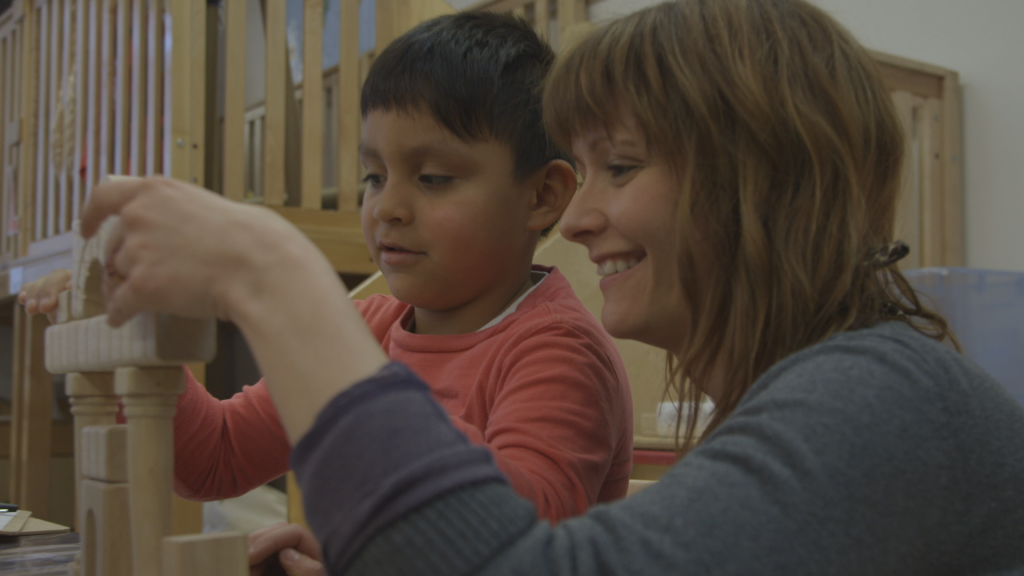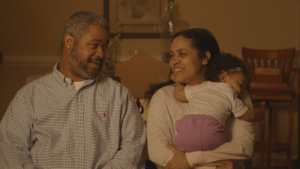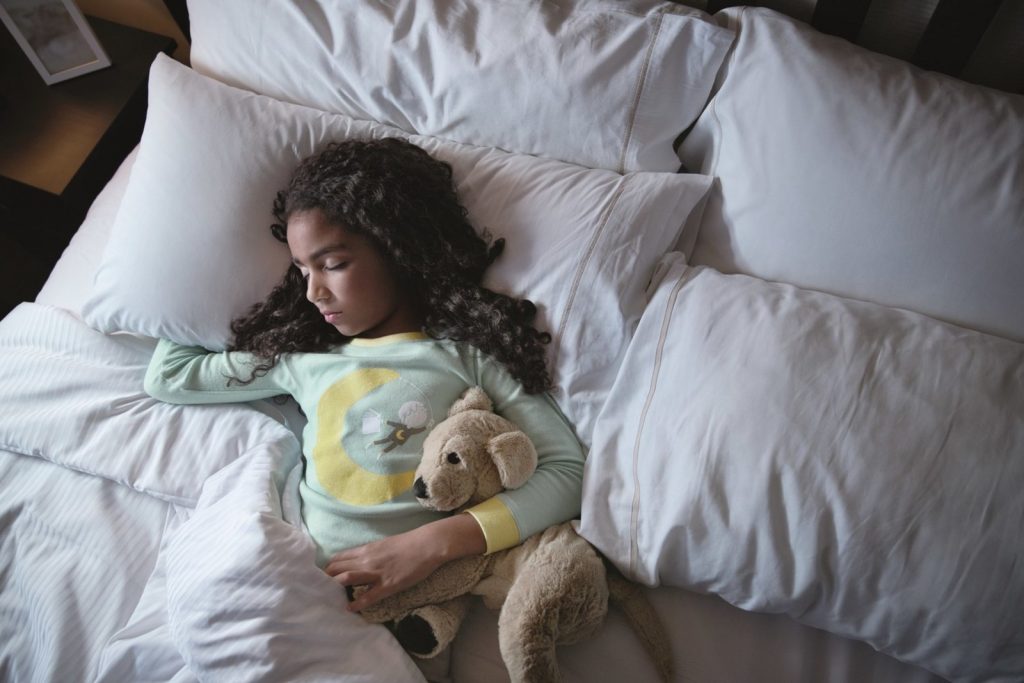June 26, 2020
by Carla Hay

Directed by Danny Alpert, Greg Jacobs and Jon Siskel
Culture Representation: The documentary “No Small Matter,” about children’s learning abilities before kindergarten age, interviews a racially diverse group of people (white, African American, Latino and Asian) who are educators, academics and parents representing the middle-class.
Culture Clash: A child’s ability to learn can be hampered by poverty, abuse, and a lack of caring adults in the child’s life, and it’s become increasingly harder for middle-class parents to afford childcare for pre-school children.
Culture Audience: “No Small Matter” will appeal primarily to parents, educators and other people who are concerned about how to teach children under the age of 6.

The documentary “No Small Matter” tackles two different but related topics, and handles one topic better than the other. The first topic (which is the one that’s handled better) is an exploration of children’s learning abilities from birth to the age of 5. The second topic is about the increasing struggles for non-wealthy parents in the United States to give their pre-school children the best possible education and learning experiences.
“No Small Matter” directors Danny Alpert, Greg Jacobs and Jon Siskel do a very good job of balancing interviews with experts and footage of real middle-class/working-class parents and pre-school children. The documentary gives a fairly comprehensive overview of children’s learning abilities before they reach school age. The movie also advocates for better support systems for parents of pre-school children, as affordable childcare become increasingly difficult for parents who have to work outside the home.
The best scenes in the film are with childhood educator Rachel Giannini, who was working at the time at Highland Park Community Nursery School and Day Care Center in Highland Park, Illinois. Her infectious enthusiasm for teaching kids and giving them positive encouragement to be themselves in their learning process are inspiring for anyone who wants to know how a good pre-kindergarten teacher should be.
Narrated by Alfre Woodard (who is also the documentary’s executive producer), “No Small Matter” covers subject matter that a lot of people might already know. For example, it’s fairly common knowledge that babies can start learning from birth. Andrew Meltzoff, co-director of the Institute for Learning and Brain Sciences, tells a story of interacting with a baby who was just 42 minutes old. He saw that when he stuck out his tongue, the baby immediately did the same, which is an indication of how quickly newborn babies can learn imitation skills.
The documentary also mentions the new technology that’s available to study babies’ brain activities. Institute for Learning and Brain Sciences co-director Patricia Kuhl declares that it’s possible to see what’s going on in a baby’s brain before the baby can talk. However, the documentary could have used a little more discussion about how devices such as smartphones and tablets can affect brain activity for pre-school children.
One of the best aspects of “No Small Matter” is that the film has an impressive and diverse list of experts who are interviewed. The academics include University of California at Berkeley psychology professor Alison Gopnick; Georgetown University psychology professor Deborah Phillips; Temple University psychology professor Kathy Hirsh-Pasek; University of Wisconsin pediatrics professor Dipesh Navsaria; and University of Wisconsin psychology professor Seth Pollak.
There are also several leaders of children-oriented nonprofit organizations, such as Center for Youth Wellness founder/pediatrician Nadine Burke Harris; Zero to Three executive director Matthew Melmed; Harlem Children’s Zone founder Geoffrey Canada; Child Care Aware of America executive director Lynette Fraga; National Association for the Education of Young Children CEO Rhian Allvin; ReadyNation co-founder Robert Dugger and AVANCE executive director Jessica Atlas.
One interview that seems a little out of place is with Sesame Workshop senior vice president of curriculum and content Rosemarie Truglio, because during the interview, she’s interrupted by “Sesame Street” character Cookie Monster, who does a comedic skit with her. It’s supposed to be funny, but it comes across as too staged, awkward and perhaps some kind of sponsorship deal that the filmmakers made with Sesame Workshop. If people want to watch “Sesame Street” skit, they can watch “Sesame Street.” It doesn’t need to be in this documentary during what’s supposed to be a serious interview.
Several people in the documentary say things are already well-known: There’s a direct link between poverty, lack of education and crime. People who end up in prison are more likely to be poor and uneducated (not completing a high-school education) than people who not poor and not educated. Aside from the fact that prisons are filled with poor people who can’t afford good legal representation, poor and uneducated people are less likely to get jobs that can pay a living wage, thereby increasing the possibility that they will turn to crime to make money.
It’s a vicious cycle that experts say has the greatest chance of being broken by giving poor people the education that can increase their chances to climb out of poverty. Pennsylvania Department of Corrections secretary John Wetzel says, “True criminal justice reform is investing in early childhood education.” Arthur Rudnick, a former economist at the Federal Reserve Bank of Minneapolis, adds: “You won’t find a better return than investing in early childhood education.”
But the rising cost of that early education is something that’s become increasingly difficult for working-class and middle-class families. Shea Gattis is named in the documentary as an example of someone who benefited from early education as a way to prevent some of the negative lifestyle circumstances and choices that plague low-income communities. Gattis is part of the Carolina Abecedarian Project, launched in 1972, which has been tracking him for more than 40 years since his childhood. He came from a low-income community, but received early education through the project and has been thriving as a law-abiding citizen with a good career.
The documentary shows three families who are struggling with making ends meet and having affordable child care for their pre-school children.
- A married couple in Yorktown, Virginia—special-education teacher Wahnika Johnson and systems administrator Larry Johnson—have to put their daughter Laryn in day care after Wahnika’s maternity leave ends and she has to go back to work. The movie shows that how this transition has an emotional effect on Wahnika.
- A married couple in Henderson, Nevada—nail technician Shannon Poff and security guard Donnie Poff—work two different shifts so that one can be home to take care of their son Daymean, who was born with a heart defect. Daymean’s medical bills have put the couple heavily in debt.
- A single mother in Waco, Texas—Maria Hernandez—uses the nonprofit AVANCE program, which provides free child care for low-income families in the area.
It’s not exactly news to report that many families struggle with being able to afford childcare. What the documentary could have explored better is how a program like AVANCE works and is able to get funding and how a program like AVANCE can be implemented in other communities who need these programs the most.
Melmed comments that the U.S. military has “the best family support system in the United States.” It’s a belief confirmed by U.S. Army first-class sergeant Keacha Simmons, a mother who is interviewed kin the film. That’s great, but considering that most families in the U.S. don’t get military benefits, “No Small Matter” could have taken a closer look at people and organizations that are doing something about the problem of making good childcare affordable to families.
People already know that teachers/educators of children are grossly underpaid in the United States. With most budgets of cities, counties and states already stretched to the limits, it seems as if the future of early childhood education has to rely more on private funding. Where are all the billionaires who can help? And if a lot of wealthy people are helping, where is the money going? No one seems to ask these questions in the documentary.
Melmed has this to say about one of the best ways to rethink childcare and to make it more fun and educational for kids: “It’s not babysitting. It’s brain building.” “No Small Matter” is a good documentary that examines the issues and problems of educating pre-school age children in the United States. However, the documentary would have been much better if it also focused on realistic and attainable solutions.
Abramorama released “No Small Matter” on digital and VOD on June 26, 2020. The movie’s DVD release date is June 30, 2020.

